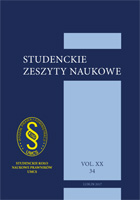De la reprise de l’acquis communautaire par des pays tiers sur l’exemple de l’Accord sur la libre circulation des personnes entre l’Union européenne et la Suisse
Adoption of the acquis communautaire by Third Countries on the Example of The Agreement on Free Movement of Persons Between the European Union and Switzerland
Author(s): Kaja WęglarzSubject(s): Law, Constitution, Jurisprudence, International Law, Public Administration, Public Law, EU-Legislation
Published by: Wydawnictwo Naukowe Uniwersytetu Marii Curie-Sklodowskiej
Keywords: Switzerland; free movement of persons; bilateral agreements; Europeanization; acquis communautaire;
Summary/Abstract: The article analyzes the ways of adoption of the acquis communautaire by non-member states. In case of Switzerland, it is a polymorphic phenomenon achieved through international agreements as well as domestic legislation. In the agreements the following characteristics may be combined in various ways: the degree of integration provided for in the agreement (integration, cooperation or liberalization agreements are distinguished), the dynamic or static adoption of the acquis, the principle of direct applicability of EU law or the equivalence of legislation, the scope of the reference made (or lack thereof) to the case law of the Court of Justice. The Europeanization in Switzerland is partial and mostly static, which results in incompatibility between the constantly developing EU law and the rules applicable in EU’s relations. Switzerland does not participate in the internal market and relies on the classical intergovernmental cooperation, without establishing any supranational bodies.
Journal: Studenckie Zeszyty Naukowe
- Issue Year: 20/2017
- Issue No: 34
- Page Range: 87-98
- Page Count: 12
- Language: French

